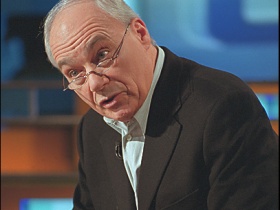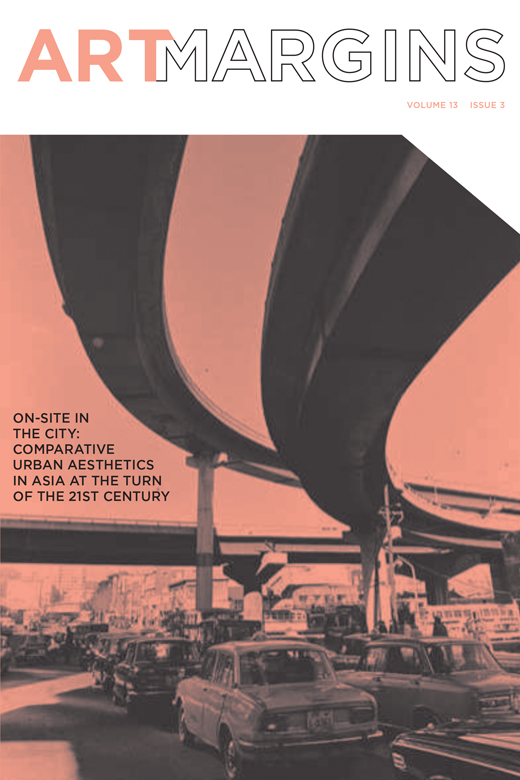The “Vremena” Show: Russian Television Between Extremism and Moderation (Film & Screen Media)
 The Russian TV show Vremena [Times] represents a synthesis of Western and Soviet models. The show, recently discontinued, was moderated by the Western-trained Vladimir Pozner.(Vladimir Pozner’s biography: http://www.russiaproject.org/part2/titans/pozner.html (accessed October 14, 2010).) Pozner rose to prominence during the early perestroika years by co-hosting several US-Russia video–links and by acting as a critical political observer. His persona is important for an understanding of Vremena’s format. Vremena was what is known in Russian as an authorial [avtorskaya] program, organized around the personality and concerns of a charismatic broadcaster who adopts the stance of a leading intellectual. As a discussion-based show, Vremena inherently stood at a greater distance from the official discourse of the center and it embraced a much wider range of voices. Even in an environment of severe government restrictions it therefore had the dual potential both to undermine and to authenticate official government positions. A particularly interesting and important consequence of this duality was the show’s coverage of Russia’s recent dramatic increase in xenophobic tension and violence, especially the inter-ethnic confrontation between ethnic Russians and Chechens in Kondopoga (Karelia, North-Western Russia) in 2006.
The Russian TV show Vremena [Times] represents a synthesis of Western and Soviet models. The show, recently discontinued, was moderated by the Western-trained Vladimir Pozner.(Vladimir Pozner’s biography: http://www.russiaproject.org/part2/titans/pozner.html (accessed October 14, 2010).) Pozner rose to prominence during the early perestroika years by co-hosting several US-Russia video–links and by acting as a critical political observer. His persona is important for an understanding of Vremena’s format. Vremena was what is known in Russian as an authorial [avtorskaya] program, organized around the personality and concerns of a charismatic broadcaster who adopts the stance of a leading intellectual. As a discussion-based show, Vremena inherently stood at a greater distance from the official discourse of the center and it embraced a much wider range of voices. Even in an environment of severe government restrictions it therefore had the dual potential both to undermine and to authenticate official government positions. A particularly interesting and important consequence of this duality was the show’s coverage of Russia’s recent dramatic increase in xenophobic tension and violence, especially the inter-ethnic confrontation between ethnic Russians and Chechens in Kondopoga (Karelia, North-Western Russia) in 2006.
The incident started on August 30, 2006 in a Chechen-owned restaurant with a conflict between two ethnic Russians and an Azerbaidjani waiter, allegedly an illegal immigrant. The waiter called for help from the local Chechens who started randomly attacking people outside the restaurant. As a result of the brawl, two men were killed and nine were seriously injured. Within the next few days, the tensions developed further as the locals attempted to set fire to stalls, garages, and cafés owned by the Chechens. A number of Chechen families were temporarily evacuated from the town.
The extensive mass media treatment of this event signalled official alarm over its severity and its implications for social cohesion. At the same time, it further legitimated the promulgated ideology of ethnic nationalism, where government figures, sub-official institutional networks, and extreme nationalist groupings merge into an unspoken alliance.(See Aleksander Verkhovskii, “Ideological Evolution of Russian Nationalism: 1990 and 2000” Upper and Lower Levels of Russian Nationalism (?oscow: SOVA, 2007). The article is available at http://www.polit.ru/research/2007/12/28/verhovsky.html (accessed February 14, 2010).)
Due to their inherently pluralist format, discussion shows have the potential to challenge official knowledge. Here expert opinions may be subjected to a scathing critique articulated by the audience and mediated by the host. In Russia serious discussion shows started disappearing as the state, under Yeltsin and then still more under Putin, reasserted its overbearing influence on television—one that it had never fully relinquished.(Remaining discussion forums such as Savik Shuster’s Svoboda Slova [Freedom of Speech] and Glas naroda [People’s Voice] were banned.) These shows were replaced by increasingly frivolous chat show formats.
The Russian tok-shou has thus generally acquired the “status of a ‘safe’ entertainment form.”(See, Stephen Hutchings and Natasha Rulyova, Television and Culture in Putin’s Russia: Remote Control (London: Routledge, 2009). In Russia the tok-shou [talk-show] emerged within the context of a long-standing literary tradition and the overwhelming respect for the written word. This meant that television as a medium was considered subordinate to “higher” cultural forms. The genre of the talk show was derived from the Western paradigm of live, unmediated (and low cultural) chat (Hutchings and Rulyova, 2009). As a result, the Russian tok-shou floats between what Western media discourse has divided into separate categories: the chat show (interviews with celebrities); the talk show (popular issues involving ordinary guests and invited audiences); and the discussion show (politicians and public figures debating serious issues with one another, often before a studio audience). The closest Western equivalent to the Russian tok-shou is a political discussion show.) The pseudo-serious Russian talk shows that did succeed in staying on the air demonstrated compliance with a rigid, new set of requirements. They invariably allowed minimal scope for audience participation and the range of issues and guests they can accommodate was severely constrained. By looking at how inter-ethnic issues raised by the Kondopoga incident are dispersed across multiple viewpoints (official, semi-official and popular) in one of the last genuine discussion shows to feature on Russian television (Vremena), I want to explicate the potential and danger that this format entailed for an authoritarian regime such as Putin’s.
 Pozner’s Vremena adopted the standard Russian discussion show format in which political and social issues are discussed by a panel of experts in response to questions from a host (rather than, as in many Western variants, from members of an audience). At first glance, by expanding the circle of guests to include representatives from the artistic and cultural realm (e.g. film directors), the host attempted to bolster the influence of liberal thinking. However, the range of such liberal experts was limited and their views were often barely distinguishable from the government perspective. Its prime time scheduling guaranteed Vremena one of the biggest possible audience shares (the show was broadcast on Sunday evening). But its very presence on one of the most heavily state-controlled channels undermined its effort to portray itself as offering free-ranging discussion of controversial themes and topics. Vremena was one of the few Russian television shows broadcast live, which, for obvious reasons, imposed severe limitations on who could be invited. On the face of it, the show’s sustained run (8 years on air before it was discontinued in 2008) would seem to illustrate what Andrew Wilson has called Russia’s “virtual politics”(Andrew Wilson, Virtual Politics: Faking Democracy in the Post-Soviet World (New Haven, CT: Yale University Press, 2005).), its attempt to go through the motions of imitating democratic forms which, however, remain hollow and carefully managed from the center.
Pozner’s Vremena adopted the standard Russian discussion show format in which political and social issues are discussed by a panel of experts in response to questions from a host (rather than, as in many Western variants, from members of an audience). At first glance, by expanding the circle of guests to include representatives from the artistic and cultural realm (e.g. film directors), the host attempted to bolster the influence of liberal thinking. However, the range of such liberal experts was limited and their views were often barely distinguishable from the government perspective. Its prime time scheduling guaranteed Vremena one of the biggest possible audience shares (the show was broadcast on Sunday evening). But its very presence on one of the most heavily state-controlled channels undermined its effort to portray itself as offering free-ranging discussion of controversial themes and topics. Vremena was one of the few Russian television shows broadcast live, which, for obvious reasons, imposed severe limitations on who could be invited. On the face of it, the show’s sustained run (8 years on air before it was discontinued in 2008) would seem to illustrate what Andrew Wilson has called Russia’s “virtual politics”(Andrew Wilson, Virtual Politics: Faking Democracy in the Post-Soviet World (New Haven, CT: Yale University Press, 2005).), its attempt to go through the motions of imitating democratic forms which, however, remain hollow and carefully managed from the center.
When tackling Vremena’s format, one should note the relevance of its “authorial” host and his lengthy concluding monologues. These monologues tended to close down and resolve the issues rather than leave the discussion open-ended, as in a Western-style discussion-show. This was also evident in Pozner’s frequently authoritarian interventions in the free flow of debate during the show. His repertoire of interventions was diverse, ranging from uncritical acceptance of his guests’ positions to bold challenges to their views and to the articulation of highly personalized counter-opinions.
Moreover, Pozner frequently polemicized with his pro-government guests by referring to special reports, surveys, etc., as well as by weaving a liberal-intellectual or personal-biographical position into his official and professional-journalistic discourse. He was, for example, prone to mentioning his own Jewishness and his cosmopolitan knowledge of the USA and Paris, where he resided for years. His demeanour bordered on the theatrical, and was often grounded in the culture of the written word. But Pozner also adopted techniques acquired during his experience as an American journalist, such as drawing the speakers into revealing their personal views when they were reluctant to acknowledge them. Evidence of the effects of Pozner’s contradictory style of moderating was abundant in his approach to the Kondopoga incident.(My analysis is based on the Vremena edition broadcast on October 1, 2006, and on a later edition I refer briefly to for comparative purposes. See Channel One online, Vremena, Kondopoga: http://www.1tv.ru/owa/win/ort6_main.main?p_news_title_id=94410&p_news_razdel_id=102 (accessed May 21, 2009).)
Vremena treated this incident within a series of different frameworks: socio-economic, international (including references to the supposed “clash of Christian and Islamic civilisation” and the recent Paris race riots), security, local authorities/police corruption, racial/inter-ethnic tension, and national identity. Despite the fact that Pozner’s guests represented different parts of society (politics, academia, and civil society), their close affiliation with the state made the discussion predictable. The two positions at the opposite end of the narrow spectrum during his episode on Kondopoga were represented by a member of the ultra-nationalist Liberal Democratic Party of Russia (headed by Vladimir Zhirinovskii), the outspoken Nikolai Kurianovich, who promoted the interests of ethnic Russians. At other end of the spectrum was the academic Valerii Tishkov who articulated more liberal views.
The discussion showed the migration of populist xenophobia from the peripheries of the acceptable to the discourse of the center. Yet Pozner did not comment on this shift, leaving all the extremist remarks without reprimand. For example the Duma Deputy Vladimir Vasiliev was allowed to pontificate at length, claiming that “the situation at the markets is the basis for such conflicts in [the] future […] Why do Slavic nations deviate from this? Because they are more obedient to the law …We left the Chechen republic (after the fall of the USSR) […] and if previously we got brigades of builders from there […] then now we get criminals and terrorists.”
Kurianovich, meanwhile, raged indignantly that “instead of fighting against ethnic criminal groupings there is an attempt to ascribe everything to everyday problems, to solve everything at the expense of Russians.” He, too, was left unchallenged by Pozner. Yet the host’s passivity in the face of such explicitly extremist statements contradicted his passionate pleas for tolerance and understanding in later instalments of Vremena. For instance, in the episode devoted to skinheads that aired on July 1, 2007, Pozner challenged racist sentiments of all kind, likening them to a “boiling broth covered by foam” (an established expression in Russian), itemizing the reasons for the rise of extreme nationalism in Russia, and using his own recent personal experience of anti-Semitism to spell out the dangers of ignoring the problem.
The Kondopoga episode did include a range of relatively moderate speakers. Yet their contributions failed to cohere into a consensus capable of rebuffing the nationalist groundswell. These guests proved incapable of tying the various themes (economic, ethnic, liberal-progressive, etc.) into a single narrative. When articulating the interests of the ethnic minorities they lacked genuine concern for those minorities. For instance, deep concerns about the deprivation suffered by the ethnic minorities articulated by the leader of the Communist Party, Gennadii Ziuganov, failed to gel with his vigorous defence of the rights of ethnic Russians. What is more, Pozner was himself unable to avoid overtly racist language(In several programs Pozner used (even if in part ironically) derogatory, politically incorrect names for certain races: blacks [chernye], or “narrow-eyed ones” [uzkoglazye].) while at the same time challenging this kind of xenophobia.
Despite the fact that the issue was analyzed from a variety of perspectives, the course of the debate in this instance was unusual compared with that in other episodes, such as the one devotedto skinheads in Russia. From the start, the host pointedly refused to engage in explicit moderation: the first round of speakers’ comments on the issue proceeded without any intervention from Pozner. He merely sought the opinion of his guests within a mechanistically deployed structure, advancing the discussion in a thoroughly predictable, repetitive manner. Pozner was reluctant to weave in and out of the positions expressed by his guests in a Western-style exploratory way. His inability to make sense of, or and rationalize, the contradictory turns in the argumentation of his guests betrayed the rifts between the positions he had to reconcile rather than his incompetence as a moderator.
Pozner is well-known for his concluding perorations that draw both on both the moralistic official-style Soviet speeches and on the Russian liberal tradition of foregrounding the intellectual’s duty to take responsibility for achieving societal harmony.(In doing this Pozner adopts the role of the intelligent [intellectual] who takes it upon himself to challenge and “attenuate” extremism.) However, at the end of the Kondopoga episode, Pozner deviated from his own tradition by switching to an unrelated theme, choosing pointedly to withdraw from the contestation of the topic. In so doing he was perhaps tacitly signalling his rejection of the way in which his show was being framed by an official viewpoint that he was compelled to endorse.
Paradoxically, Vremena is both more liberal-progressive and more right-wing (authoritarian) than the standard view of Russian state media allows. This has to do with the host’s failure to articulate Western liberal tolerance and the nationalist counter-discourse to which it is opposed. Even sophisticated state broadcasters like Pozner fail to identify a stable position from which to moderate the disparate extremisms that, notwithstanding government controls, filter into the mainstream via Vremena. Particularly interesting is the way in which this process maps onto the hybrid nature of the Russian talk show format, with its combination of authorial proselytising and neutral Western-style moderation.
The context in which Pozner’s anti-racist standpoint is expressed (that of a state–controlled media) renders his role counter-productive. On the one hand, Pozner’s stances (his Jewishness, his cosmopolitanism) are subjugated to the needs of the official discourse of the centre (as reflected in restrictions imposed on the range of invited guests permitted). On the other hand, despite being woven into the state’s patriotic agenda, Pozner’s personal opposition to xenophobic sentiment remains starkly obvious (he has challenged racist sentiment of all kind throughout his career and continues to do so). This raises the intriguing question as to whether his case is one of dissident thinking slipping through the official net, or whether his show merely served as a pseudo-liberal safety valve to authenticate the government’s patriotic-xenophobic line. When Vremena was finally discontinued in the summer of 2008 and replaced with a new talk show in which Pozner was restricted to just one guest per edition (the show is simply called Pozner) we received an answer to that question.
This article was written with the generous support of the Arts and Humanities Research Council of the UK and Gorbachev Media Fellowship. I would also like to thank Stephen Hutchings for his valuable comments on earlier versions.




